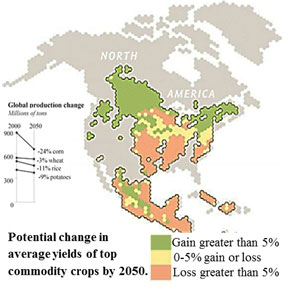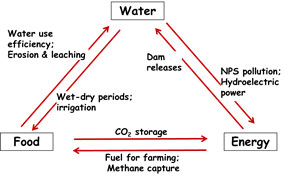
Agroecosystems in Tennessee will experience higher temperatures and climate variability in upcoming decades. We can expect to see more frequent and intense droughts, flooding, and drying-rewetting pulses, along with more pests and plant diseases. All of these can take a toll on crop yields throughout the state.
For Tennessee, crop yields are projected to drop due to a lack of sufficient soil moisture (Figure 1). This may necessitate increased fertilizer use and irrigation to offset these anticipated yield losses. Increased fertilization and irrigation will translate to excess fluxes of non-point source nutrient loads into dams, ultimately affecting dam operations to produce hydropower, especially controlled water releases to meet optimal energy production.
It is important therefore to prepare for these changes, especially given the need to maintain global food security in the face of growing demand. In response, we have coalesced nearly 30 like-minded researchers from different disciplines at the University of Tennessee (UT), in the Departments of Civil & Environmental Engineering, Biosystems Engineering & Soil Science, Biochemistry & Molecular Biology, Agricultural & Resource Economics, Communications, and Geography, as well as from the Tennessee Valley Authority (TVA) and Oak Ridge National Lab (ORNL). This coalition has become an Organized Research Unit on UT’s campus called the Initiative for Food, Water, and Energy, (IFWE). The group is led by TNWRRC director Thanos Papanicolaou and contains several affiliate researchers of the center.
As a group collective, we have been able to hone our vision by building on both our strengths and weaknesses. Our unifying thread is to enhance understanding of the nature-human couplings within the complex nexus of food-water-energy systems in Tennessee for determining systems-level responses under projected market and climate stressors.

All research is question-driven and aimed at developing a system dynamics model to address food-water-energy concerns in the southeast. This modeling framework will be the glue of IFWE’s multidimensional/ multidisciplinary analysis (Figure 2). We have taken initial steps through mini-projects to “complete” this methodological approach.
IFWE researchers have examined how water availability under enhanced dry-wet cycles affects soil quality, crop yields, and the economy of our rural communities. This work stems from a campus-wide U.S. Department of Agriculture effort as well as our involvement in the National Science Foundation Critical Zone Observatory network. Additionally, team members have examined the different roles of management, soil wetness, and erosion as they affect microbial activity, nutrient cycling, and hence crop productivity through targeted experiments. This research allowed us to observe the cause-and-effect relationships of the involved processes. Understanding the interactions and feedbacks between climate, management, and microbial-nutrient dynamics is essential for developing resilient cropping systems and agro-technologies that ensure food security. Finally, members of IFWE have used newspaper content analysis to explore behavioral characteristics of rural communities. The lack of longitudinal data tracking the connection between human decision making and land management is one key data gap. The data are virtually nonexistent, which impedes our ability to describe this cause-and-effect relation. Understanding the interactions and feedbacks between climate, management, and microbial-nutrient dynamics is essential for developing resilient cropping systems and agro-technologies that ensure food security.
Finally, members of IFWE have used newspaper content analysis to explore behavioral characteristics of rural communities. The lack of longitudinal data tracking the connection between human decision making and land management is one key data gap. The data are virtually nonexistent, which impedes our ability to describe this cause-and-effect relationship.
We are now examining how variability in the interplay between water and crops affects the quantity and quality of water in hydroelectric power reservoirs. Specifically, we are seeing how human-driven scheduling of water levels in these reservoirs to ensure sufficient energy production will be affected by shifts in the interplay and resulting land management. We will also rethink how organic-rich sediment and trapped methane in the fore bay area of dams can be used to cut down the dam’s operational footprint.
To further IFWE efforts on campus, subsets of team members are developing both large interdisciplinary proposals and peer-reviewed papers.